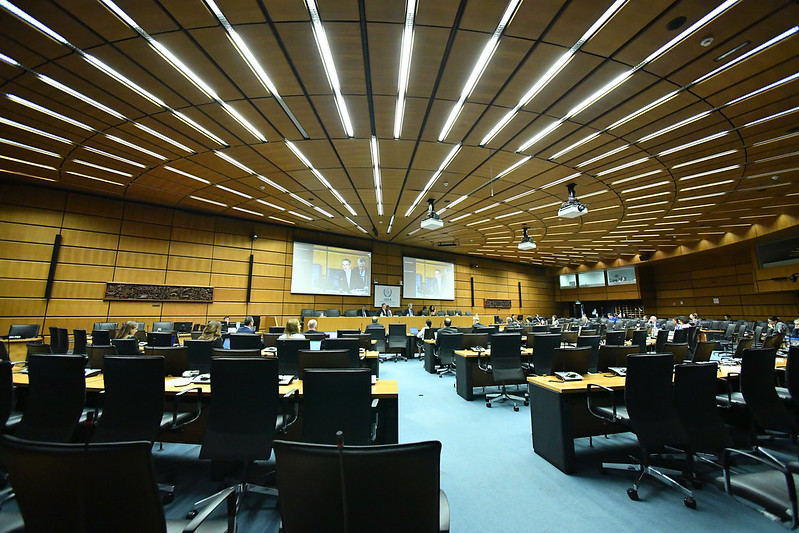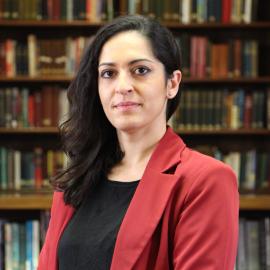Europe Continues to Brush Off the U.S. Maximum Pressure Campaign Against Iran
Despite the optics of a recent resolution at the International Atomic Energy Agency, Europe continues to oppose the U.S. policy line on Iran.

Published by The Lawfare Institute
in Cooperation With

On June 19, the board of governors of the International Atomic Energy Agency (IAEA) passed a resolution expressing “serious concern” over Iran’s refusal to provide the agency with access to two facilities suspected of possibly having hosted undeclared nuclear materials and activities. The resolution came two years after the U.S. pulled out of the Iran nuclear deal (also known as the Joint Comprehensive Plan of Action or JCPOA) and reimposed sanctions on Iran. It was drafted and tabled by France, Germany and the United Kingdom (known as the E3), leading to speculations that Europe might have finally decided to join the U.S. maximum pressure campaign against the Islamic Republic. However, despite the optics of the resolution, this does not appear to be the case.
The resolution follows discovery by the IAEA in January 2019 of uranium particles that appear to have resulted from human activity at an undeclared location in Iran. The agency suspects that, between 2002 and 2003, Iran may have carried out nuclear-related activities—including nuclear fuel cycle research and development, and conventional explosive testing—at three different facilities inside Iran. Since summer 2019, the agency has requested access to and information about these facilities as part of its verification activities relating to Iran’s Comprehensive Safeguards Agreement (CSA) and the related Additional Protocol (AP), which are both linked to Iran’s obligations under the Treaty on the Non-Proliferation of Nuclear Weapons. The AP, in particular, grants the IAEA the right to request access to suspected undeclared nuclear facilities.
Despite the requests, Iran has denied the agency access and has failed to provide necessary clarifying information. Tehran has justified this refusal by arguing that its previous nuclear activities had been addressed in the 2015 IAEA report on the possible military dimensions of the Iranian nuclear program. The full disclosure of Iran’s past nuclear activities and the resolution of outstanding IAEA questions around the program was a prerequisite for implementation of the JCPOA. Iran has also questioned the credibility of the agency’s intelligence, given that suspicions about undeclared Iranian nuclear activities seem to have originated from a trove of documents reportedly collected from an Iranian warehouse by Israeli intelligence services. The IAEA has not made reference to such documents directly in its reports or the latest resolution and has repeatedly stressed that it independently corroborates any data it receives.
The E3-drafted resolution at the IAEA calls on Iran to cooperate fully with the agency as per its nonproliferation obligations under the AP. On the same day the resolution came out, the E3 also issued a statement reiterating their concerns about the more recent nuclear activities that Iran has undertaken in breach of its JCPOA obligations as a response to the U.S. withdrawal from the deal. The Europeans stressed that these actions undermine the nonproliferation benefits of the agreement.
However, such criticism and the recent IAEA resolution should not be understood as endorsements of the U.S. maximum pressure campaign, which the E3 continue to oppose. In that same statement, the E3 reiterated their commitment to the JCPOA. As the U.K. ambassador to the U.N. noted in his remarks during a virtual meeting of U.N. Security Council members two weeks ago, in the absence of a viable alternative, the E3 continue to believe that “the agreement provides the best means of achieving [their] shared objectives on regional security and stability, upholding the nuclear nonproliferation regime and ensuring the continued authority and integrity of the Security Council.”
Perhaps the clearest demonstration of the E3’s continued opposition to the U.S. maximum pressure campaign has been the Europeans’ rebuke of the appeal by U.S. Secretary of State Mike Pompeo to extend the conventional arms embargo on Iran beyond the October 2020 expiration date set out under the JCPOA. During the Security Council meeting that took place at the end of June, the German representative noted that the E3 shared U.S. concerns over the lifting of the arms embargo but also that sanctions on missile technology and transfers of arms by Iran to non-state actors will remain in place. This would presumably temper the implications of the embargo’s expiration on regional security and stability. The E3 have also made clear that they would not support U.S. attempts to trigger a “snapback” of all U.N. sanctions on Iran, as Washington has threatened to do should its attempts at extending the arms embargo fail.
In opposition to the U.S. policy line on Iran, the E3 have remained committed to the survival of the JCPOA and have tried to isolate issues relating to the agreement from the concerns raised in the IAEA resolution. However, this is a fine line to walk and the Europeans’ messaging risks getting lost in translation.
Since the passage of the IAEA resolution, Tehran has slammed the E3 for playing into the hands of the U.S. and condemned the document, stating that “once again [the E3] showed that they are powerless countries which cannot be trusted.” Iran also voiced its intention to take “appropriate action” in response to the resolution. On July 3, Tehran triggered the JCPOA’s dispute-resolution mechanism, citing concerns about “implementation issues by France, Germany and the United Kingdom” under the JCPOA. Iran’s triggering of the mechanism carries little practical significance, as the process was already initiated by the E3 in January and is still ongoing; however, it serves to further heighten tensions between Tehran and the Europeans.
The Iranian Parliament’s National Security and Foreign Policy Committee has also ratified a motion to oblige the government to halt its voluntary implementation of the AP, following passage of the agency resolution. If Iran’s triggering of the dispute-resolution mechanism does not lead to the collapse of the JCPOA, failure to voluntarily implement the AP could instead, given that the deal explicitly requires Iran to comply with the AP as part of its transparency and confidence-building obligations. The lack of an AP would also curtail some of the IAEA’s monitoring capabilities in Iran, potentially reigniting concerns about the nature of the Iranian nuclear program. Iran’s Deputy Foreign Minister Abbas Araghchi warned on July 6 that the current situation at the IAEA could lead to a referral of the Iranian file to the U.N. Security Council at the next meeting of the IAEA board of governors. This outcome would threaten to push the Iran file back to 2006, when such a referral last took place, increasing the risk of a military escalation and hampering the prospects for a diplomatic resolution to the crisis.
While daunting, such a scenario is in itself unlikely to keep Iran from escalating its nuclear activities in response to the IAEA resolution. The role of the E3 and their ability to wisely use the limited tools at their disposal will be crucial over the next few weeks. Making their continued commitment to the deal and opposition to the U.S. maximum pressure campaign clear—in spite of their concerns about Iran’s cooperation with the IAEA and in relation to the lifting of the arms embargo—could help assuage some concerns in Tehran. Taking a strong stance vis-a-vis the U.S. on the legality of a country that is no longer part of the deal triggering sanctions “snapback” would certainly help to send the right message to all parties involved.
But to properly face the challenges at the Security Council, the E3 will also need to maintain a united front with the remaining parties to the JCPOA: Russia and China. Both countries voted against the IAEA resolution and issued strong statements in opposition. Over the next weeks and months, the E3 should focus on increasing the chances of the JCPOA’s survival by coordinating with Moscow and Beijing—key allies when it comes to standing up against the U.S. maximum pressure campaign. Without such efforts, the E3 countries risk witnessing the collapse of one of their greatest foreign policy achievements.





